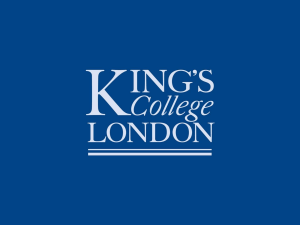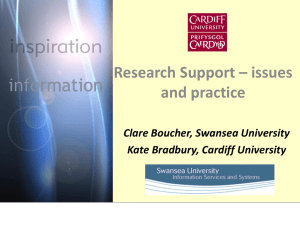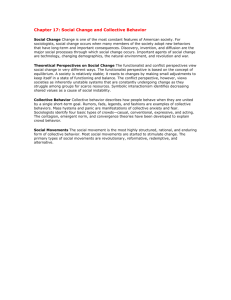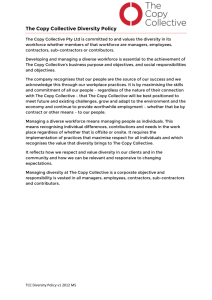Collections Unbound
advertisement
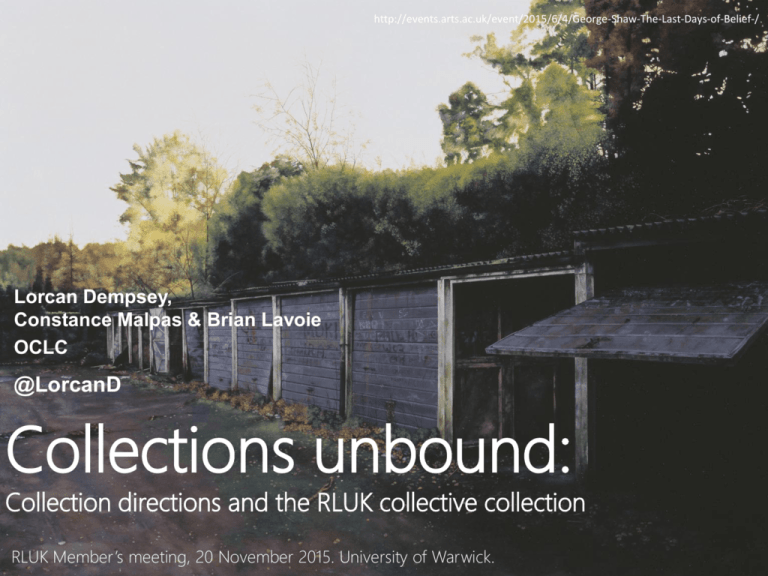
http://events.arts.ac.uk/event/2015/6/4/George-Shaw-The-Last-Days-of-Belief-/ Lorcan Dempsey, Constance Malpas & Brian Lavoie OCLC @LorcanD Collections unbound: Collection directions and the RLUK collective collection RLUK Member’s meeting, 20 November 2015. University of Warwick. Overview 4 contexts 3 trends 1 project 4 contexts 1 The logic of print distribution influenced library development: • Close to user – multiple library collections. • Big = good. • Just in case. The bubble of growth in twentieth-century printed collections has left … librarians with a tricky problem. Barbara Fister New Roles for the Road Ahead: Essays commissioned for ACRL’s 75th Birthday 2 An abundance of resources in the network world 3 Discovery moved to the network level • Peeled away from local collection • “Discovery happens elsewhere” 4 From consumption to creation: • Support process as well as product. • Workflow is the new content.. • Support for publishing and digital scholarship. • An inside out perspective increasingly important. http://www.against-the-grain.com/2012/11/a-publishers-new-job-description/ Annette Thomas, CEO of Macmillan Publishers (now Chief Scientific Officer Springer Nature) A publisher’s new job description Her view is that publishers are here to make the scientific research process more effective by helping them keep up to date, find colleagues, plan experiments, and then share their results. After they have published, the processes continues with gaining a reputation, obtaining funds, finding collaborators, and even finding a new job. What can we as publishers do to address some of scientists’ pain points? 3 trends 1 Strategic management of the collective print collection • Managing down print. • Emerging shared infrastructure and collective action. • Variable mission to collect/preserve. • Space reconfigured around experiences rather than collections. Mega-regions & Shared Print Initiatives Orbis-Cascade MSCS OCUL WEST CIC WRLC SCELC GWLA ASERL FLARE We expect that in 5-7 years the larger part of the North American ‘collective collection’ will have moved into shared management. OCLC Research, 2013 Strategic management of the shared print collection Then: Value relates to depth and breadth of local collection. Now: Value relates to systemwide curation of and access to print collections – ‘rightscaling’. 14 2 From curation to creation • The emerging scholarly record. • Workflow is the new content. • Process and product. From curation to creation Then: Value relates to management of the ‘products’ of research. Now: Value relates to support of productivity and process of research and learning. 18 3 From owned/licensed to facilitated. • Organized around user needs • Curation is community oriented? • Inside out vs outside in. Catalog KB/Discovery LibGuides, etc Google, ResearchGate, etc … Separation of discovery and collection?: • Focus shifts from owned to facilitated (available)? • More emphasis on making institutional resources discoverable? • Systemwide thinking becomes stronger? Owned Licensed Available Global Figure: Discoverability redefines collection boundaries. OCLC Research, 2015. Towards facilitated collection Then: Value relates to locally assembled collection. Now: Value relates to ability to efficiently meet a variety of research and learning needs. 21 1 project The RLUK Collective Collection A joint initiative of RLUK and OCLC Research Goal: Explore characteristics of aggregate RLUK bibliographic resource in context of members’ strategic priorities Powered by WorldCat: Leverage distinctive data-driven, multi-scalar (local, group, global) perspective of OCLC’s international union catalogue Building on foundations: Complement and advance recent OCLC Research work on collective collections & shared print Community engagement: Refine analysis via consultation with RLUK advisory group RLUK Advisory Group Janet Aucock Suzy Cheeke Sue Elphinstone Gill Hamilton University of St Andrews University of Bristol University of York National Library of Scotland Frances Machell University of Birmingham Victoria Parkinson King’s College London Laura Shanahan University of Edinburgh June Tomlinson David Prosser Wellcome Library RLUK OCLC and shared print Research focus – systemwide Service focus – library and group • Highlight features of the collective collection • Establish systemwide evidence base to inform decision-making • Accelerate collaborative action • Increase confidence in community planning and directions • Visualise and model collections • Support ‘above the institution’ collection management • Make the shared print workflow less labor-intensive • Use data to support and supplement the expertise of librarians and faculty Sustainable Collection Services GreenGlass Impact “Perhaps the most influential descriptive studies have come from OCLC Research, which has now shared reports outlining both levels of uniqueness as well as duplication among various aggregations of library collections. This growing body of computationally intensive analysis of the collective collection has also begun to clarify geographic distribution and other key characteristics of library collections relevant for decision making around coordinating activities. There is new understanding of collections at scale.” Karla Strieb, Ohio State University Collaboration: The Master Key to Unlocking 21st Century Library Collections Some outputs Collective Collections … in Europe Collective print book collection Collective collection (all materials) • • • • Collection overlap across libraries within group Patterns of shared collection investment Important collection differentiators Comparison to peer collective collections (e.g. ARL, other European research libraries) • Overlap with international digital repositories (e.g. HathiTrust) • Extend geographic focus of our collective collection work • Provide intelligence about collective holdings to support strategic planning A note on data sources • Preliminary analysis based on 34 RLUK library symbols in WorldCat, representing 32 RLUK institutions • Several institutions have very low holdings in WorldCat that could be addressed through reclamation projects, e.g. Exeter, Newcastle, Nottingham, Senate House, Southampton, York. • A few RLUK institutions won’t be included: National Library of Wales, Queens University Belfast • University of Leicester, University of Reading, and Royal Holloway joined RLUK after project started and are not represented here. • Data reported here is based on preliminary analysis; figures will change as more data becomes available. RLUK Collective Collection: anecdotally speaking ? Most widely held (in RLUK) monographic titles: Meadows, Donella H., Dennis L. Meadows, and Jørgen Randers. 1992. Beyond the limits: global collapse or a sustainable future. London: Earthscan Publications Richards, John F. 1993. The Mughal Empire. Cambridge: Cambridge University Press Miles, Matthew B., and A. M. Huberman. 1994. Qualitative data analysis: an expanded sourcebook. Thousand Oaks: Sage Publications. RLUK Collective Collection: ? anecdotally speaking Ranked order of UK ‘minority language’ titles: Welsh Irish Scottish Gaelic Scots Cornish Manx 55,759 titles 18,593 titles 6,267 titles 2,964 titles 338 titles 183 titles RLUK Collective Collection: Top Work* Works with the greatest number of editions in RLUK libraries Oliver Goldsmith. The vicar of Wakefield. 1,025 editions John Milton. Paradise lost. 951 editions John Bunyan. The pilgrim’s progress. 917 editions Lewis Carroll. Alice’s adventures in Wonderland. 877 editions Dante. The divine comedy. 754 editions James Thomson. The Seasons. 712 editions Torquato Tasso. Jerusalem delivered. 663 editions Terence. Comedies. 645 editions Virgil. Works. 629 editions Laurence Sterne. A sentimental journey. 590 editions *excluding the Bible RLUK Collective Collection: Scope 28M 28M titles* titles/manifestations* 77% works with single edition 19M 19M creativeworks works creative 23% works with 2+ editions Avg. = 1.5 manifestations/editions per work *distinct publications; de-duplicated OCLC numbers Data current as of September 2015 RLUK Collective Collection: Material types 5% serials 5% musical scores 87% books (includes print, audio books, e-books) Data current as of September 2015 3% maps, visual resources, computer files, etc. RLUK Collective Collection: Places of publication Top 10 countries 36% . . 1% . 2% 1% 13% 6% . . 5% 2% . India: 2% Russia: 1% Data current as of September 2015 RLUK Collective Collection: Size 28M titles* 57M holdings in RLUK libraries Avg. = 2 RLUK holdings per title *distinct publications; de-duplicated OCLC numbers Data current as of September 2015 980M holdings in WorldCat Avg. = 35 WorldCat holdings per title RLUK Collective Collection: Duplication rates In-group Duplication of RLUK-held Titles N = 28M 90% scarce, distinctive at RLUK scale 0% 10% 20% 30% 40% 50% 60% 70% 80% WorldCat Duplication of RLUK-held Titles 90% 100% N = 28M 60% scarce, distinctive at WorldCat scale 0% 10% Data current as of September 2015 20% 30% 40% 50% 60% 70% 80% 90% 100% …which RLUK contributed record has garnered the most holdings in WorldCat contributed by the British Library in 2010 used as source copy by >3000 libraries Data current as of September 2015 ? Next steps Complete preliminary analysis; consult with RLUK advisory group November/December 2015 Update/finalise analysis when reclamation are complete 1st Quarter 2016 (January – March) Publish report, including analysis, inferences and observations (not prescriptive recommendations) April/May 2016 We welcome feedback Contact malpasc@oclc.org to be added to project listserv The end Discovery at network level Support for research/creation Space Local collections
